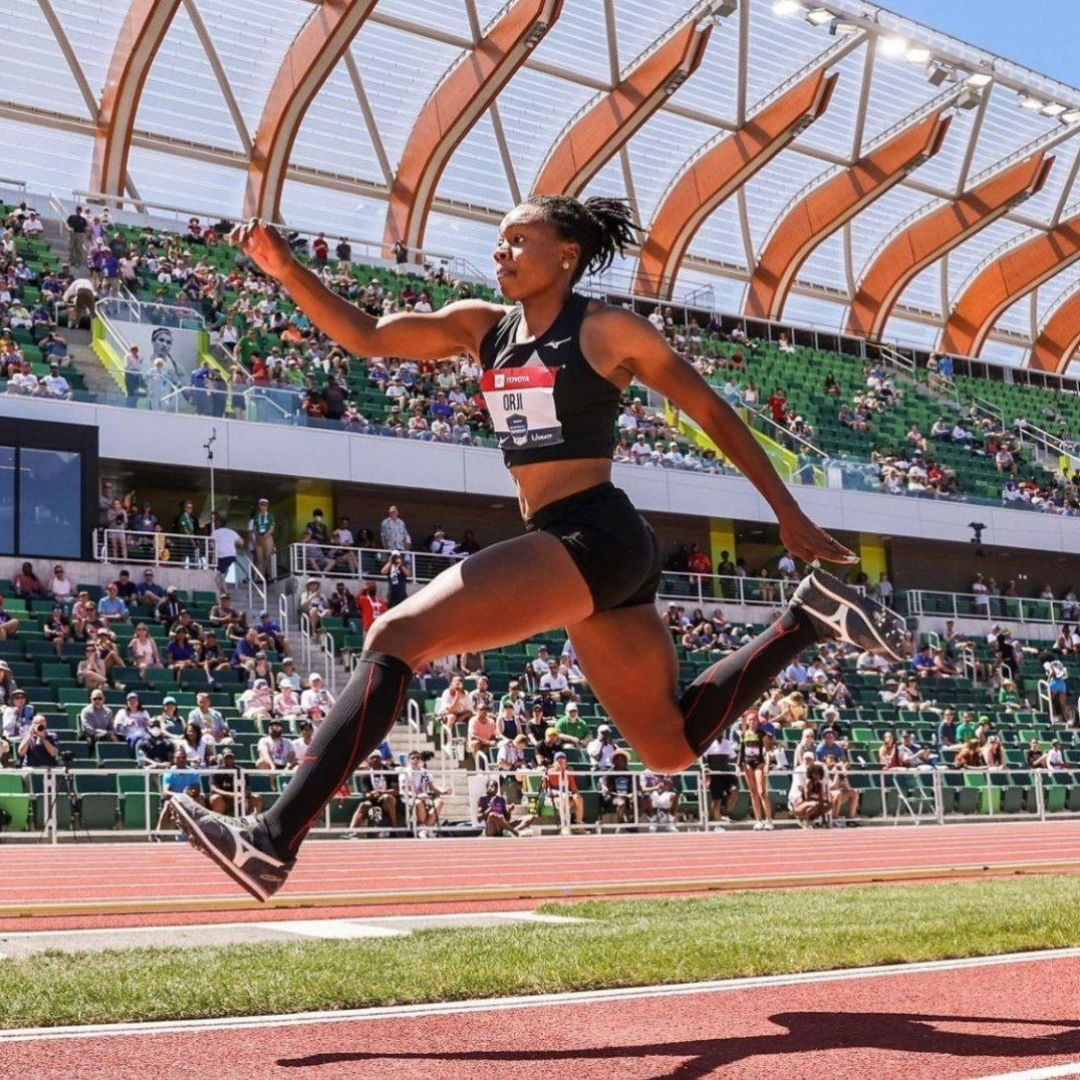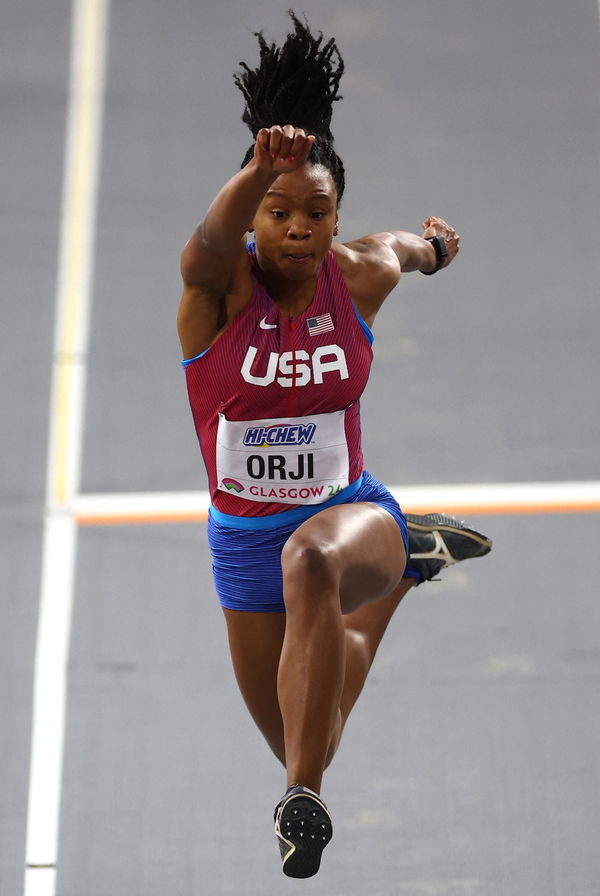

The crowd at Hayward Field watched in awe as a young triple jumper sprinted down the runway, gathering speed before launching into a near-perfect sequence of hop, step, and jump. When she landed at 14.53 meters, she had not only won the NCAA Outdoor Championship but also shattered the American record, becoming the first U.S. woman to surpass 14.50 meters. That moment in 2016 was just the beginning for Keturah Orji. Weeks later, she would go on to make history at the Rio Olympics with the best-ever finish by an American woman in the triple jump event. She would go on to have two further Olympic appearances and her last one in Paris came against the backdrop of her impending retirement at 28.
Watch What’s Trending Now!
As a Mount Olive High School senior, Orji won almost every title: New Balance Nationals, Penn Relays, Meet of Champions, Group III, North 1 Group III, Morris County, and NJAC Large Schools in both the long jump and triple jump. The two-time national record-breaking triple jumper gave everything to the sport she loved. But since 2020, the sacrifices piled up—time away from her husband, the relentless grind, the feeling of being stretched too thin. She had pushed through it all until she couldn’t anymore. While the news of her retirement was common knowledge by the time she stepped foot in Paris for a final shot at glory, she only recently opened up about the reasons why she decided to retire in a blog post.
On Monday, Orji made a lengthy post on her website writing, “Do know that prayer played a huge role in helping me make my final decision about retirement. This blog focuses on the other factors that influenced the decision.” Orji had a promising career and accomplished a lot before her sudden decision to retire caught many in the track and field community by surprise. But as it turns out, she had plenty of reasons to step back.
ADVERTISEMENT
At first, she listed her dwindling performances as the biggest reason behind her decision. “I’m a numbers person, and I believe numbers don’t lie,” she wrote. Year after year, the distances shrank. She averaged 14.51m, hitting a best of 14.72m in 2019. By 2024, that best had dropped to 14.50m, with an average of just 14.12m. The trend was clear. But her second reason was more personal as she was having difficulty balancing her family life.
“Since 2020, I’ve moved from Georgia to Florida, to California, back to Georgia, and then to Maryland, all in pursuit of finding a coach to help me accomplish my goals. For context, my husband and I bought a house together in 2020, but I spent more time away than home. IF and only IF I were seeing improvement, I might have continued, but sacrificing time with my husband while underperforming became a non-option,” Orji wrote.
Orji got married to Smith in a small ceremony in August 2020 at a church in Athens, Georgia. She had been based in her adoptive hometown of Atlanta and will finally be able to live full-time with her husband Kisean Smith, a CPA and her former University of Georgia teammate. Since their marriage, Orji has already been part of two Olympics and multiple other competitions and has made records along the way. But now a move to a more quiet life away from the track suits her.
The former Georgia star has been the most accomplished American woman ever in the triple jump. She has 10 U.S. national titles to her name and made the U.S. Olympic team on three occasions, finishing fourth at the 2016 Rio Olympic Games, while still a collegian. She also made three World Championship and four World Indoor Championship teams and won a Pan American Games silver in the long jump in 2019. Moreover, She set the American Record in the triple jump three times, doing it twice in 2016 and again in 2021.
At the Paris Olympics, she finished ninth, which may not have been the fitting farewell she was looking for, but she has a lot to look forward to.
Having studied financial planning as a student-athlete, she is well-versed in wealth management, retirement planning, and other major financial topics. As she approached her retirement last year, she announced plans for a new mentorship program to invest in young athletes and spread financial literacy to her community.
Last year, she passed the national exam to become an accredited financial counselor and hopes to transition to a full-time role after ending her track and field career. Orji has also “been putting out into the atmosphere” a dream of staying involved in the sport, but not as a coach.
View this post on Instagram
Still, her decision to retire at an early age was surprising, especially given how she had performed over the years.
In her blog, she listed numerous other reasons as to why she didn’t want to continue her career in track and field. She had moved across the country, chasing coaching, better conditions, and answers. But the harder she pushed, the less the results followed. The grind of elite sport is relentless, demanding not just physical excellence, but an emotional investment that often goes unnoticed.
Keturah Orji’s unfinished business with triple jump
What keeps an athlete going? Is it passion? Talent? The pursuit of greatness? For Orji, it was all of the above until it wasn’t. She had heard it so many times before, ‘Just have fun’. But for Orji, fun was never about the event itself. It was in the wins, the camaraderie, the shared journey with teammates. When those things faded, the sport started to feel empty. The destination had always mattered, but what about the company along the way?
“I always found it funny when I was at competitions and coaches would tell me “just go out there and have ‘fun’” because in all honesty triple jump/long jump was never something I would describe as fun, in the traditional sense,’” she wrote on the same blog.
Continuing further, she wrote, “Winning was fun. Training with teammates was fun. Traveling and seeing friends at competitions was fun. But when those things faded —no teammates, no close friends at meets, fewer wins—the sport lost its joy.” Then came the physical toll, the silent warning signs every athlete dreads.

Reuters
Athletics – World Athletics Indoor Championships – Commonwealth Arena, Glasgow, Scotland, Britain – March 3, 2024 Keturah Orji of the U.S. in action during the women’s triple jump final REUTERS/Hannah Mckay
By 2024, Orji’s body was speaking louder than her ambitions – a back injury that made sitting unbearable. A knee that only functioned with anti-inflammatories, despite the risk of liver damage. The pain was one thing, but pain without progress? That was something else entirely.
“If I were improving, I might have endured the pain,” she admitted. “But with no significant progress, it didn’t make sense to keep pushing my body past its limits.”
So, what happens when an athlete who has given everything to a sport walks away? Does she regret it? Or does she finally feel free? For Orji, the answer is still unfolding. But one thing is certain; she leaves with no doubt that she gave it all.
ADVERTISEMENT
ADVERTISEMENT
ADVERTISEMENT
ADVERTISEMENT

